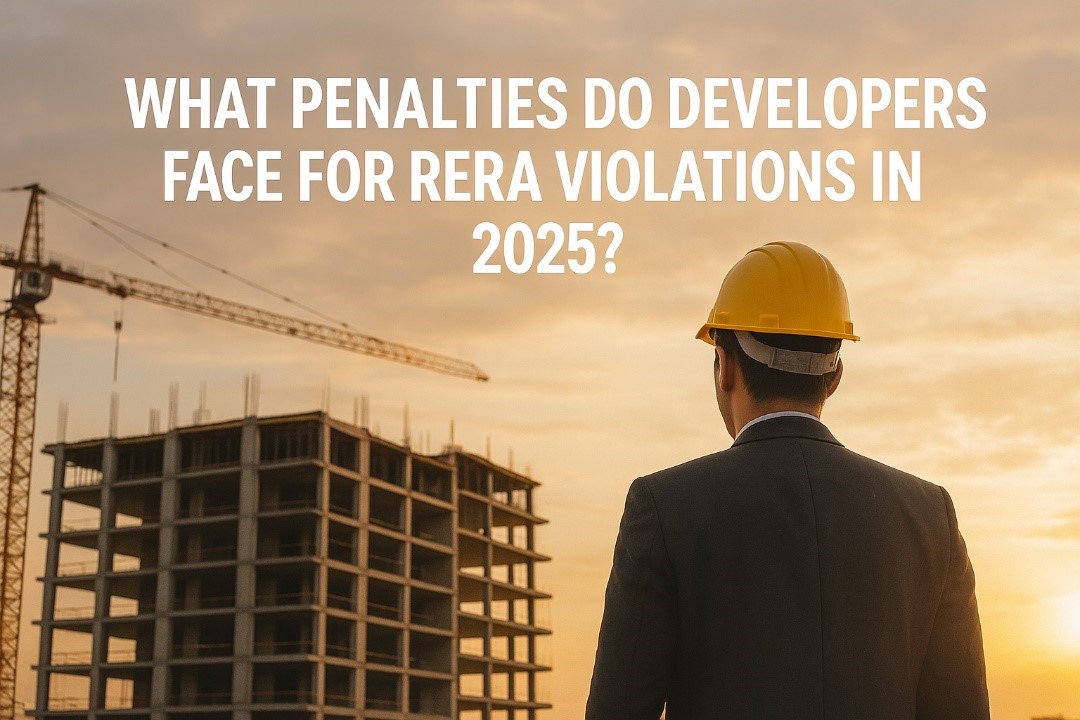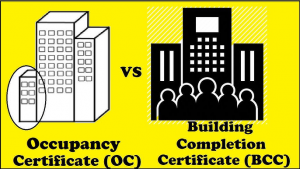The Real Estate (Regulation and Development) Act, 2016 — popularly known as RERA — was a game-changer for India’s real estate sector. Designed to ensure accountability, transparency, and timely delivery of housing projects, it has transformed how builders operate and how homebuyers invest. But as we move into 2025, RERA enforcement has become even stricter.
Today, violations are not just minor infractions—they come with hefty monetary penalties, blacklisting threats, and even imprisonment for developers. This blog explores, in detail, what penalties developers face under RERA in 2025, including non-registration fines, false advertising charges, escrow account violations, and much more.
What Happens If a Developer Fails to Register a Project Under RERA in 2025?

Registration under RERA is mandatory for every real estate project exceeding 500 square meters or involving more than eight apartments. Non-registration is treated as a serious violation, leading to severe repercussions.
In 2025, the RERA non-registration penalty is 10% of the project cost. If the builder continues to flout rules even after receiving notice, RERA can impose imprisonment for up to three years or levy an additional fine that may extend to another 10% of the project cost.
This rule ensures that no builder can bypass mandatory registration and launch projects informally. The intent is to protect homebuyers from fraudulent or unregulated ventures.
What Is the Penalty for Providing False Information or Misleading Details?

Transparency lies at the heart of RERA compliance. Builders are obligated to submit authentic project details, from land title and carpet area to layout approvals and timelines.
If a developer provides false or misleading information, they can face a RERA false information penalty of 5% of the project cost. This penalty applies to both false documentation and deceptive project representations in public domains.
The RERA authority also has the power to suspend the project registration if the builder’s submission is proven to be fabricated or intentionally deceptive.
Can Developers Be Imprisoned for RERA Violations in 2025?

Yes, imprisonment under RERA isn’t just theoretical—it’s real. For grave offenses like non-registration, defying RERA orders, or continuous non-compliance, developers can face imprisonment of up to three years.
This measure ensures that serious violators don’t merely pay fines and move on. In 2025, can developers go to jail for RERA violations? Absolutely—especially when authorities determine deliberate fraud, fund misappropriation, or repetitive non-compliance.
What Are the RERA Fines for Builders in 2025?

The RERA fines for builders in 2025 vary depending on the nature and gravity of the offense. Let’s understand some common scenarios:
- Non-registration penalty – 10% of the project cost.
- False information or misleading documentation – 5% of the project cost.
- Failure to comply with RERA orders – Daily penalty up to 5% of the project cost or imprisonment.
- Repeated violations – Suspension or cancellation of project registration.
RERA’s enforcement mechanism ensures that fines are both punitive and reformative, discouraging repeated offenses.
What Is the Penalty for Violating RERA Orders by Promoters?
When a promoter ignores or refuses to comply with RERA or RERA Appellate Tribunal orders, the consequences are severe.
The penalty for violating RERA orders as a promoter can reach up to 5% of the project cost for each instance of non-compliance. Additionally, persistent defiance may result in RERA imprisonment for developers up to 3 years.
In such cases, the RERA appellate tribunal non-compliance penalty ensures builders cannot undermine the authority’s verdicts or delay justice.
What Is the RERA Delay Compensation and Refund Rule?

Delayed possession has long been a pain point for homebuyers. Under RERA, this issue is directly addressed through RERA delay compensation refund with interest.
If a developer fails to hand over possession by the promised date, they must:
- Refund the entire amount paid by the buyer, along with interest.
- Alternatively, if the buyer chooses to stay invested, the builder must pay monthly interest for every month of delay until possession is granted.
This ensures that homebuyers are not financially disadvantaged due to the developer’s inefficiency.
How Strict Is RERA About the 70% Escrow Account Rule?

One of RERA’s most significant provisions is the RERA escrow account 70 percent compliance rule.
Developers must deposit 70% of the collected funds from buyers into a dedicated escrow account, used solely for construction and land costs. Failure to maintain this segregation can lead to financial penalties, suspension of the project, or criminal prosecution.
This rule prevents fund diversion and protects homebuyers’ investments by ensuring their money is used only for their project.
Also Read:- MahaRERA Resolves 5,267 Homebuyer Complaints in Just 10 Months
What Is the Daily Penalty for Contravention Under RERA?

When a developer continues to violate orders or fails to comply within stipulated timeframes, the daily penalty for contravention under RERA applies.
This penalty can accumulate rapidly, as RERA imposes daily fines until compliance is achieved. The total amount, however, is typically capped at 5% of the total project cost.
This daily fine system ensures time-bound adherence and discourages procrastination by developers.
What Happens If a Developer Publishes Misleading Advertisements or Brochures?

In 2025, RERA penalty for misleading ads and brochure claims has become a common enforcement category.
If a developer promotes a project with untrue amenities, inaccurate carpet area, or deceptive visuals, they are liable for penalties up to 5% of the project cost, and the advertisement must be withdrawn immediately.
This ensures that buyers are not misled by glossy but false marketing campaigns.
Can Builders Be Blacklisted or Have Their Project Registration Suspended Under RERA?

Yes. RERA authorities hold the power to enforce blacklisting and project registration suspension.
When a builder continuously violates laws or accumulates multiple complaints, RERA can blacklist the developer, suspend ongoing project registrations, and even bar them from launching future projects for a fixed period.
This blacklisting acts as both punishment and deterrence for unethical practices.
What Are the Consequences for Not Complying With RERA Authority Orders?

Failure to comply with the directives issued by the RERA authority or appellate tribunal is treated as willful defiance.
The consequences for not complying with RERA authority orders include hefty fines, blacklisting, and imprisonment. The RERA Appellate Tribunal may also direct the local authorities to halt construction or cancel the project registration entirely.
Such provisions ensure that developers take the authority’s orders seriously.
What Is the Developer Punishment for RERA Violations and Delays?
The developer punishment for RERA violations and delays can be cumulative and multi-tiered. A single violation can lead to multiple actions—financial penalties, blacklisting, criminal prosecution, or even imprisonment.
In the case of project delays, builders must pay RERA delay compensation refund with interest, apart from facing potential license suspensions.
What Is the Role of the RERA Appellate Tribunal in Enforcing Penalties?

The RERA appellate tribunal acts as the final authority to hear appeals against the decisions of state RERA bodies.
It ensures that both homebuyers and developers have a fair hearing. However, non-compliance with tribunal orders leads to strict penalties, including daily fines and possible imprisonment under the RERA appellate tribunal non-compliance penalty clause.
Can a Developer Avoid Penalty by Appealing or Delaying Proceedings?
While RERA allows appeals, the authority closely monitors misuse of this provision.
Developers filing appeals solely to delay compliance can face additional fines and contempt charges. Moreover, the appeal must be accompanied by at least 30% of the penalty amount already deposited, ensuring that builders cannot exploit legal loopholes.
Are Penalties Under RERA Recoverable Like Land Revenue?
Yes. RERA ensures strong enforcement by treating unpaid penalties as recoverable land revenue.
This means state authorities can seize the builder’s property, freeze accounts, or auction assets to recover unpaid dues—giving RERA unmatched enforcement teeth in 2025.
Can Builders Face Both Civil and Criminal Penalties Simultaneously?
Yes, in cases of repeated or deliberate fraud, RERA authorities can initiate both civil and criminal proceedings.
For example, submitting false information may trigger a 5% fine, while repeated non-compliance could lead to RERA imprisonment for developers up to 3 years. Both can run concurrently, making violations extremely costly.
Do Penalties Differ for Promoters, Agents, and Allottees?
While this blog focuses on builders, it’s worth noting that real estate agents and buyers can also face RERA penalties for specific violations.
However, promoters and developers face the highest degree of accountability, as they manage project execution, fund collection, and documentation—hence the stricter penalty framework.
Can RERA Revoke Registration After Issuing a Penalty?
Yes, if a developer continues to violate the Act even after fines are imposed, RERA can revoke project registration.
Once revoked, the builder cannot advertise, sell, or develop the project further, and the authority can appoint a new promoter or administrator to complete the project.
Conclusion
As we step into 2025, RERA’s enforcement landscape has evolved into a formidable regulatory system that demands accountability at every stage of project development. The days when developers could get away with delays, misleading claims, or fund diversions are long gone.
Today, penalties such as RERA non-registration penalty (10% of project cost), false information fines (5%), RERA imprisonment up to 3 years, daily contravention penalties, and blacklisting ensure complete transparency and discipline.
At Housiey, we firmly believe that strict RERA compliance is not just a legal necessity but also a moral one that restores buyer confidence.
For those looking to explore the regulatory side of homeownership further, we urge you to read our insightful blog on “Housing Society Rules” — it’s an essential guide for every homeowner.
FAQs
The Real Estate (Regulation and Development) Act, 2016 — popularly known as RERA — was a game-changer for India’s real estate sector. Designed to ensure accountability, transparency, and timely delivery of housing projects, it has transformed how builders operate and how homebuyers invest. But as we move into 2025, RERA enforcement has become even stricter.
Today, violations are not just minor infractions—they come with hefty monetary penalties, blacklisting threats, and even imprisonment for developers. This blog explores, in detail, what penalties developers face under RERA in 2025, including non-registration fines, false advertising charges, escrow account violations, and much more.
What Happens If a Developer Fails to Register a Project Under RERA in 2025?

Registration under RERA is mandatory for every real estate project exceeding 500 square meters or involving more than eight apartments. Non-registration is treated as a serious violation, leading to severe repercussions.
In 2025, the RERA non-registration penalty is 10% of the project cost. If the builder continues to flout rules even after receiving notice, RERA can impose imprisonment for up to three years or levy an additional fine that may extend to another 10% of the project cost.
This rule ensures that no builder can bypass mandatory registration and launch projects informally. The intent is to protect homebuyers from fraudulent or unregulated ventures.
What Is the Penalty for Providing False Information or Misleading Details?

Transparency lies at the heart of RERA compliance. Builders are obligated to submit authentic project details, from land title and carpet area to layout approvals and timelines.
If a developer provides false or misleading information, they can face a RERA false information penalty of 5% of the project cost. This penalty applies to both false documentation and deceptive project representations in public domains.
The RERA authority also has the power to suspend the project registration if the builder’s submission is proven to be fabricated or intentionally deceptive.
Can Developers Be Imprisoned for RERA Violations in 2025?

Yes, imprisonment under RERA isn’t just theoretical—it’s real. For grave offenses like non-registration, defying RERA orders, or continuous non-compliance, developers can face imprisonment of up to three years.
This measure ensures that serious violators don’t merely pay fines and move on. In 2025, can developers go to jail for RERA violations? Absolutely—especially when authorities determine deliberate fraud, fund misappropriation, or repetitive non-compliance.
What Are the RERA Fines for Builders in 2025?

The RERA fines for builders in 2025 vary depending on the nature and gravity of the offense. Let’s understand some common scenarios:
- Non-registration penalty – 10% of the project cost.
- False information or misleading documentation – 5% of the project cost.
- Failure to comply with RERA orders – Daily penalty up to 5% of the project cost or imprisonment.
- Repeated violations – Suspension or cancellation of project registration.
RERA’s enforcement mechanism ensures that fines are both punitive and reformative, discouraging repeated offenses.
What Is the Penalty for Violating RERA Orders by Promoters?
When a promoter ignores or refuses to comply with RERA or RERA Appellate Tribunal orders, the consequences are severe.
The penalty for violating RERA orders as a promoter can reach up to 5% of the project cost for each instance of non-compliance. Additionally, persistent defiance may result in RERA imprisonment for developers up to 3 years.
In such cases, the RERA appellate tribunal non-compliance penalty ensures builders cannot undermine the authority’s verdicts or delay justice.
What Is the RERA Delay Compensation and Refund Rule?

Delayed possession has long been a pain point for homebuyers. Under RERA, this issue is directly addressed through RERA delay compensation refund with interest.
If a developer fails to hand over possession by the promised date, they must:
- Refund the entire amount paid by the buyer, along with interest.
- Alternatively, if the buyer chooses to stay invested, the builder must pay monthly interest for every month of delay until possession is granted.
This ensures that homebuyers are not financially disadvantaged due to the developer’s inefficiency.
How Strict Is RERA About the 70% Escrow Account Rule?

One of RERA’s most significant provisions is the RERA escrow account 70 percent compliance rule.
Developers must deposit 70% of the collected funds from buyers into a dedicated escrow account, used solely for construction and land costs. Failure to maintain this segregation can lead to financial penalties, suspension of the project, or criminal prosecution.
This rule prevents fund diversion and protects homebuyers’ investments by ensuring their money is used only for their project.
Also Read:- MahaRERA Resolves 5,267 Homebuyer Complaints in Just 10 Months
What Is the Daily Penalty for Contravention Under RERA?

When a developer continues to violate orders or fails to comply within stipulated timeframes, the daily penalty for contravention under RERA applies.
This penalty can accumulate rapidly, as RERA imposes daily fines until compliance is achieved. The total amount, however, is typically capped at 5% of the total project cost.
This daily fine system ensures time-bound adherence and discourages procrastination by developers.
What Happens If a Developer Publishes Misleading Advertisements or Brochures?

In 2025, RERA penalty for misleading ads and brochure claims has become a common enforcement category.
If a developer promotes a project with untrue amenities, inaccurate carpet area, or deceptive visuals, they are liable for penalties up to 5% of the project cost, and the advertisement must be withdrawn immediately.
This ensures that buyers are not misled by glossy but false marketing campaigns.
Can Builders Be Blacklisted or Have Their Project Registration Suspended Under RERA?

Yes. RERA authorities hold the power to enforce blacklisting and project registration suspension.
When a builder continuously violates laws or accumulates multiple complaints, RERA can blacklist the developer, suspend ongoing project registrations, and even bar them from launching future projects for a fixed period.
This blacklisting acts as both punishment and deterrence for unethical practices.
What Are the Consequences for Not Complying With RERA Authority Orders?

Failure to comply with the directives issued by the RERA authority or appellate tribunal is treated as willful defiance.
The consequences for not complying with RERA authority orders include hefty fines, blacklisting, and imprisonment. The RERA Appellate Tribunal may also direct the local authorities to halt construction or cancel the project registration entirely.
Such provisions ensure that developers take the authority’s orders seriously.
What Is the Developer Punishment for RERA Violations and Delays?
The developer punishment for RERA violations and delays can be cumulative and multi-tiered. A single violation can lead to multiple actions—financial penalties, blacklisting, criminal prosecution, or even imprisonment.
In the case of project delays, builders must pay RERA delay compensation refund with interest, apart from facing potential license suspensions.
What Is the Role of the RERA Appellate Tribunal in Enforcing Penalties?

The RERA appellate tribunal acts as the final authority to hear appeals against the decisions of state RERA bodies.
It ensures that both homebuyers and developers have a fair hearing. However, non-compliance with tribunal orders leads to strict penalties, including daily fines and possible imprisonment under the RERA appellate tribunal non-compliance penalty clause.
Can a Developer Avoid Penalty by Appealing or Delaying Proceedings?
While RERA allows appeals, the authority closely monitors misuse of this provision.
Developers filing appeals solely to delay compliance can face additional fines and contempt charges. Moreover, the appeal must be accompanied by at least 30% of the penalty amount already deposited, ensuring that builders cannot exploit legal loopholes.
Are Penalties Under RERA Recoverable Like Land Revenue?
Yes. RERA ensures strong enforcement by treating unpaid penalties as recoverable land revenue.
This means state authorities can seize the builder’s property, freeze accounts, or auction assets to recover unpaid dues—giving RERA unmatched enforcement teeth in 2025.
Can Builders Face Both Civil and Criminal Penalties Simultaneously?
Yes, in cases of repeated or deliberate fraud, RERA authorities can initiate both civil and criminal proceedings.
For example, submitting false information may trigger a 5% fine, while repeated non-compliance could lead to RERA imprisonment for developers up to 3 years. Both can run concurrently, making violations extremely costly.
Do Penalties Differ for Promoters, Agents, and Allottees?
While this blog focuses on builders, it’s worth noting that real estate agents and buyers can also face RERA penalties for specific violations.
However, promoters and developers face the highest degree of accountability, as they manage project execution, fund collection, and documentation—hence the stricter penalty framework.
Can RERA Revoke Registration After Issuing a Penalty?
Yes, if a developer continues to violate the Act even after fines are imposed, RERA can revoke project registration.
Once revoked, the builder cannot advertise, sell, or develop the project further, and the authority can appoint a new promoter or administrator to complete the project.
Conclusion
As we step into 2025, RERA’s enforcement landscape has evolved into a formidable regulatory system that demands accountability at every stage of project development. The days when developers could get away with delays, misleading claims, or fund diversions are long gone.
Today, penalties such as RERA non-registration penalty (10% of project cost), false information fines (5%), RERA imprisonment up to 3 years, daily contravention penalties, and blacklisting ensure complete transparency and discipline.
At Housiey, we firmly believe that strict RERA compliance is not just a legal necessity but also a moral one that restores buyer confidence.
For those looking to explore the regulatory side of homeownership further, we urge you to read our insightful blog on “Housing Society Rules” — it’s an essential guide for every homeowner.
FAQs


















